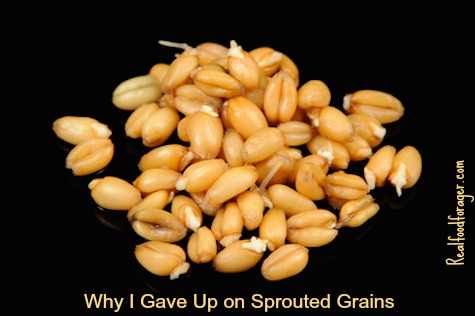Aside from all the problems with wheat and grains – such as the detrimental effects of gluten and gliadin, hydridization of wheat, deamination of gluten, allergies to wheat proteins, effects on sugar metabolism and effects on the brain – there is one dangerous component of wheat that simply cannot be deactivated.
That is – wheat germ agglutinin or wheat lectin.
What are Lectins?
Plants have evolved their own particular defensive mechanisms against predators. They contain many chemical compounds that can be toxic, such as the alkaloids in various nightshades. Plants also contain exceptionally high levels of glycoproteins called lectins, which help keep predators away and ensure the continuation of the species.
Lectins are found in all grains, seeds, legumes, dairy and the nightshade vegetables tomato and potato (part of the reason nightshades are highly inflammatory and eliminated on autoimmune diets).
Soaking, sprouting and fermentation are the traditional ways in which people have learned to prepare grains, seeds and legumes. This reduces the amount of these anti-nutrients in the food, somewhat. However, lectins are much harder to break down.
Wheat Germ Agglutinin (WGA)
The lectin called wheat germ agglutinin (WGA) or wheat lectin is particularly difficult to break down.
Sadly, WGA is found in very high amounts in sprouted grains and whole grains. – the very grains that are promoted as healthy. Those healthy whole grains are actually worse for people – especially those with leaky gut and digestive disorders.
Shocking!
When I first discovered the traditional ways of food preparation I tried sprouted grains many times. I never understood why they made me feel worse. I would get serious heartburn and bloating. Even gluten in other forms never gave me those particular symptoms – only sprouted wheat.
It wasn’t until I learned about WGA that I understood. Now, I would never eat it again.
It’s hard to convince people who want to practice the traditional way of preparing foods that some methods are just not enough for people with digestive disorders.
Does Sprouting Really Help?
The short answer is yes. The long answer is perhaps not enough for people with autoimmunity and digestive problems.
Phytic acid is another anti-nutrient that is supposedly deactivated with soaking/sprouting. However, this study published in the Journal of Food Science found that is was not effective.
Additionally, as the wheat grain germinates, the WGA is retained in the sprout and is spread throughout the plant, i.e., stems and roots. In other types of grains, sprouting may be more beneficial, but there appears to always be residual lectins. (source)
The Problem with Wheat Lectin
Even at small concentrations, WGA can stimulate pro-inflammatory cytokines (chemicals). This can lead to a cascade of inflammation in the gut.
Additionally, WGA can bind to and activate white blood cells adding to the immunological trigger. WGA have been found to be cross reactive with other common food proteins and can thus contribute to autoimmunity. For example, this study showed cross reactivity to the similarly structured peanut agglutinin and soybean agglutinin.
It has been found that WGA can penetrate the blood-brain barrier and attach to the protective coating on nerves called the myelin sheath. WGA may also inhibit nerve growth factor, a substance which is important for the longevity of neurons.
It has also been found that WGA can be toxic to cells and induce cell death.
Are Grains Nutritious?
Not really.
Even when they are properly prepared, as demonstrated above, that may not make all the nutrients bioavailable. On top of that, a person who has digestive issues is more susceptible to the ill effects.
There are no nutrients in grains that cannot be found in other foods.
People who go off grains usually find their symptoms are alleviated. As hard as it is to avoid grains in our culture, the effort is worth the reward.
Are you grain free? How has it helped you? Leave a comment and let me know!















